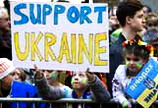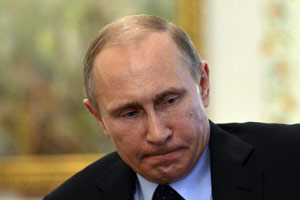China against sanctions; urges parties involved to narrow differences through political dialogue
Beijing opposes sanctions to resolve the crisis in Ukraine and wants joint efforts to find a political solution, the Chinese Foreign Ministry said on Friday, a day after the Crimean parliament voted to join Russia.Ministry spokesman Qin Gang, speaking at a news conference, urged relevant parities to engage in dialogue "within the framework of law and order" to resolve their differences.
China has been consistent in its opposition to sanctions, seeing them as a threat to international relations, Qin said, adding that it hopes all sides can avoid escalating tensions and make joint efforts to seek political solutions.
 |
| Unrest in Ukraine |
Russian Ambassador to China Andrey Denisov denied claims on Friday that Russia had seized the Crimean Peninsula by force, describing them as "nonsense and having nothing to do with the real situation on the ground."
"Measures that are being undertaken by Russia are adequate and absolutely legitimate given the extraordinary conditions, when the lives and security of the residents of Crimea and the southeastern regions are in real danger because of the irresponsible and provocative actions of ultra-nationalist elements," Denisov told China Daily in a statement.
"Crimean residents chose to act and fight chaos coming to their hometowns. Russia does not intend to interfere. However, we firmly believe that all citizens of Ukraine, regardless of their nationality, native tongue or place of residence, should be given the same equal right to participate in the life of their country and in determining its future," he said.
Experts warned that the referendum in Crimea is certain to intensify "contradictions" inside Ukraine and among major powers.
Wu Enyuan, former director of the Institute of Russian, Eastern European and Central Asian Studies at the Chinese Academy of Social Sciences, said: "According to local public opinion, it can be anticipated that Crimea will join Russia after the referendum. Russia might agree or persuade Crimea to maintain independence.
"In either case, it will be disastrous for Ukraine ... Also, the West will strongly oppose the decision, which will exacerbate tensions."
Wu said Western interference in Ukraine's internal affairs, including the expansion of NATO and the European Union, is a major reason for the current turbulence.
"China, on one hand, supports international mediation in the current situation, but on the other hand disagrees with any immoderate interference," said Wu, a member of the National Committee of the Chinese People's Political Consultative Conference.
On Tuesday, President Xi Jinping described the situation in Ukraine as "highly complicated and sensitive" during a telephone call with Russian President Vladimir Putin.
"The situation in Ukraine, ... as it is today, seems to be accidental but has elements of the inevitable," Xi said, adding that China supports proposals and mediation efforts of the international community that are "conducive to the easing of tension".
On Thursday, State Councilor Yang Jiechi called for all parties to exercise restraint and to take care of the legal interests of all ethnic groups in Ukraine. His comments came during a telephone call with US National Security Adviser Susan Rice.
Wu said China's response has been prudent, as it views the issue in a historic perspective.
"Crimea has very deep historical connections with Russia. It was a battlefield where, during World War II, Russians shed blood, and is therefore a place of core interest to Russia," Wu said.
"Moscow is not trying to seize the area by coercion, and China's response has shown understanding on that point."
Zhang Yunling, a senior research fellow at the Chinese Academy of Social Sciences, said China's way of mediating the crisis should be balanced and should take into account the relationship with Russia.
"Now that major world powers are involved, the situation in Ukraine is getting more complicated," Zhang said.
China's understanding of Russian claims is based on the strategic and cooperative partnerships the two states signed, but China should also try its best at mediation efforts to avoid the situation deteriorating into regional conflicts, Zhang said.
Contact the writers at [email protected] and [email protected]
 |
 |
